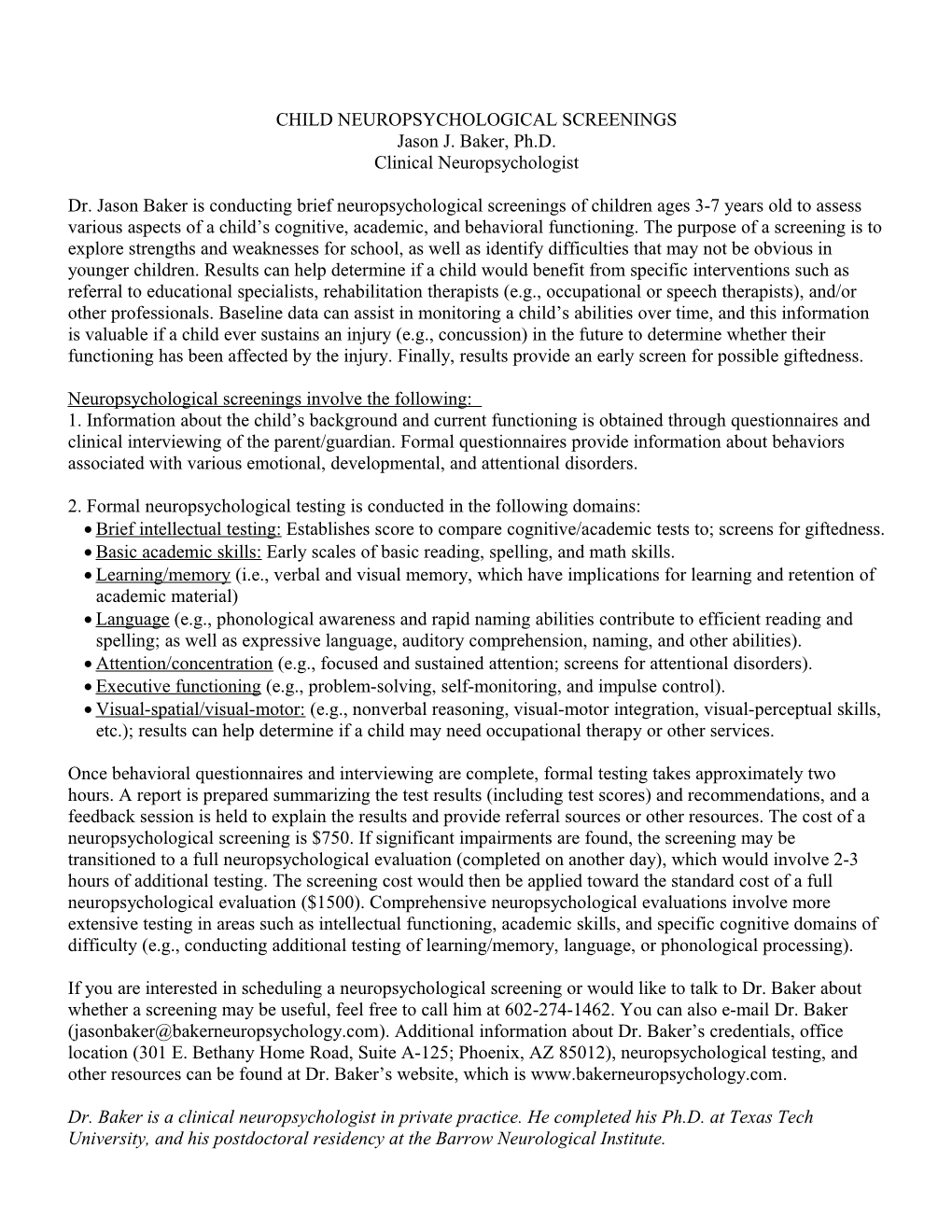CHILD NEUROPSYCHOLOGICAL SCREENINGS
Jason J. Baker, Ph.D.
Clinical Neuropsychologist
Dr. Jason Baker is conducting brief neuropsychological screenings of children ages 3-7 years old to assess various aspects of a child’s cognitive, academic, and behavioral functioning. The purpose of a screening is to explore strengths and weaknessesfor school, as well as identify difficulties that may not be obvious in younger children. Results can help determine if a child would benefit from specific interventions such as referral to educational specialists, rehabilitation therapists (e.g., occupational or speech therapists), and/or other professionals.Baseline data can assist in monitoring a child’s abilities over time, and this information is valuable if a child ever sustains an injury (e.g., concussion) in the future to determine whether their functioning has been affected by the injury. Finally, results provide an early screen for possible giftedness.
Neuropsychological screenings involve the following:
1. Information about the child’s background and current functioning is obtained through questionnaires and clinical interviewing of the parent/guardian.Formal questionnaires provide information about behaviors associated with various emotional, developmental, and attentional disorders.
2. Formal neuropsychological testing is conducted in the following domains:
- Brief intellectual testing:Establishes score to compare cognitive/academic tests to; screens for giftedness.
- Basic academic skills:Early scales of basic reading, spelling, and math skills.
- Learning/memory (i.e., verbal and visual memory, which have implications for learning and retention of academic material)
- Language (e.g., phonological awarenessand rapid naming abilitiescontribute to efficient reading and spelling; as well as expressive language, auditory comprehension, naming, and other abilities).
- Attention/concentration(e.g., focused and sustained attention; screens for attentional disorders).
- Executive functioning(e.g., problem-solving, self-monitoring, and impulse control).
- Visual-spatial/visual-motor:(e.g., nonverbal reasoning, visual-motor integration, visual-perceptual skills, etc.); results can help determine if a child may need occupational therapy or other services.
Once behavioral questionnaires and interviewing are complete, formal testing takes approximately two hours. A report is prepared summarizing the test results (including test scores) and recommendations, and a feedback session is held to explain the results and provide referral sources or other resources. The cost of a neuropsychological screening is $750. If significant impairments are found, the screening may be transitioned to a full neuropsychological evaluation(completed on another day), which would involve 2-3 hours of additional testing. The screening cost would then be applied toward the standard cost of a full neuropsychological evaluation ($1500). Comprehensive neuropsychological evaluations involve more extensive testing in areas such as intellectual functioning, academic skills, and specific cognitive domains of difficulty (e.g., conducting additional testing of learning/memory, language, or phonological processing).
If you are interested in scheduling a neuropsychological screening or would like to talk to Dr. Baker about whether a screening may be useful, feel free to call him at 602-274-1462. You can also e-mail Dr. Baker (). Additional information about Dr. Baker’s credentials, office location (301 E. Bethany Home Road, Suite A-125; Phoenix, AZ85012), neuropsychological testing, and other resources can be found at Dr. Baker’s website, which is
Dr. Baker is a clinical neuropsychologist in private practice. He completed his Ph.D. at TexasTechUniversity, and his postdoctoral residency at the Barrow Neurological Institute.
